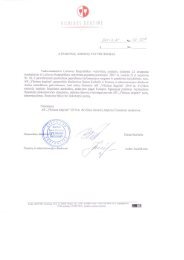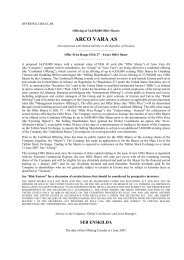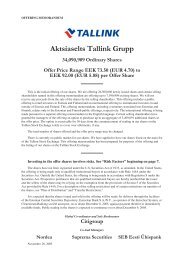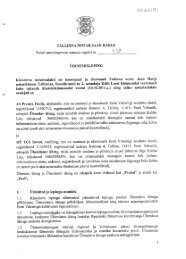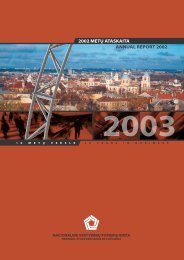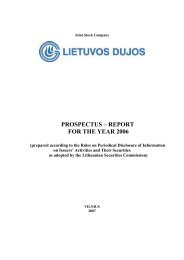AB „SNAIGĖ“ - NASDAQ OMX Baltic
AB „SNAIGĖ“ - NASDAQ OMX Baltic
AB „SNAIGĖ“ - NASDAQ OMX Baltic
Create successful ePaper yourself
Turn your PDF publications into a flip-book with our unique Google optimized e-Paper software.
Consolidated annual report for year 2008<br />
PRINCIPLES/ RECOMMENDATIONS<br />
4.4. Where decisions of a collegial body may have a<br />
different effect on the company’s shareholders, the<br />
collegial body should treat all shareholders impartially<br />
and fairly. It should ensure that shareholders are<br />
properly informed on the company’s affairs, strategies,<br />
risk management and resolution of conflicts of interest.<br />
The company should have a clearly established role of<br />
members of the collegial body when communicating with<br />
and committing to shareholders.<br />
4.5. It is recommended that transactions (except<br />
insignificant ones due to their low value or concluded<br />
when carrying out routine operations in the company<br />
under usual conditions), concluded between the<br />
company and its shareholders, members of the<br />
supervisory or managing bodies or other natural or legal<br />
persons that exert or may exert influence on the<br />
company’s management should be subject to approval of<br />
the collegial body. The decision concerning approval of<br />
such transactions should be deemed adopted only<br />
provided the majority of the independent members of<br />
the collegial body voted for such a decision.<br />
4.6. The collegial body should be independent in passing<br />
decisions that are significant for the company’s<br />
operations and strategy. Taken separately, the collegial<br />
body should be independent of the company’s<br />
management bodies 11 . Members of the collegial body<br />
should act and pass decisions without an outside<br />
influence from the persons who have elected it.<br />
Companies should ensure that the collegial body and its<br />
committees are provided with sufficient administrative<br />
and financial resources to discharge their duties,<br />
including the right to obtain, in particular from<br />
employees of the company, all the necessary information<br />
or to seek independent legal, accounting or any other<br />
advice on issues pertaining to the competence of the<br />
collegial body and its committees.<br />
YES/NO<br />
/NOT<br />
APPLIC<strong>AB</strong>LE<br />
COMMENTARY<br />
YES There haven’t been any cases of the conflict of interests<br />
between the shareholders and the Board. Neither the<br />
Articles of Association nor the Rules of Procedure of the<br />
Board of the Company have defined a specific procedure<br />
for communication with the shareholders.<br />
The Company has put in place the procedure of the provision<br />
of information to the shareholders in accordance with the Law<br />
on Companies, and this has been provided in the Articles of<br />
Association of the Company.<br />
NO There has been no suggestion to include such point into the<br />
articles of association.<br />
YES Since the collegial management body – the Board is elected by<br />
the general meeting of shareholders, in its decision making<br />
function the Board is independent from the manager of the<br />
Company.<br />
11 In the event the collegial body elected by the general shareholders’ meeting is the board, the recommendation concerning its<br />
independence from the company’s management bodies applies to the extent it relates to the independence from the company’s chief<br />
executive officer.<br />
Prepared by U<strong>AB</strong> FMĮ „Orion Securities“ p. 46





